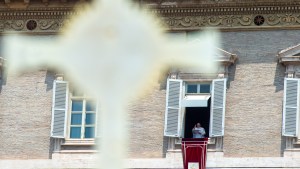It’s an election year and we are being asked to evaluate candidates and decide who would be best to lead our congressional districts, our states — and our nation.
So it’s good to remember that Jesus Christ himself also had to decide who would be best to lead. Of course, the job he “voted” for was very different. He wasn’t choosing people for political power. He was choosing for something greater — new representatives of the Twelve Tribes of Israel, men who would be the foundation stones for his new kingdom, the new Jerusalem.
Reviewing his choices is a great reminder that the future of the world is not in the hands of politicians; it is in the hands of those who are willing to be sent by God to spread his saving message.
Peter was the leader, but his brother Andrew, seemed to have more faith.
The first thing the Apostle Andrew did in the first chapter of John was to tell his brother, Simon Peter, son of Jonah, “We have found the Messiah” — naming the identity of Jesus that it takes Peter much longer to learn. Andrew is also the one who drew attention to a boy’s small offering of cheap bread and sardines as a potential source of food for thousands.
Peter had to learn his brother’s faith and trust. He began his relationship with Jesus saying, “Go away from me for I am a sinful man,” and the last thing he heard from Jesus is exactly what he heard at the beginning: “Follow me.”
John and James were so cantankerous, Jesus nicknamed them the “Sons of Thunder.”
James and John were two other brothers who were chosen. They dropped their work and left their father Zebedee in a boat to follow Jesus.
We know what they became: John is famous for his exclamations about holiness and love in the five books he wrote in the New Testament, and James is known for his New Testament letter’s insistence that we offer people not just good wishes, but also good deeds.
But that is evidence of Jesus’ good influence, not their good characters. These were the two who wanted to destroy a village that didn’t welcome them, and who tried to get VIP treatment.
In fact, we mainly know only facts that diminish the eight other apostles.
Thomas is called “Didymus,” or twin — but unlike the sons of Jonah and Zebedee, he (apparently?) never brought his sibling to Jesus. Thomas is so fickle he would be known for false confidence if he wasn’t so well known for doubt.
Judas Thaddeus is best known for not being the betrayer Judas Iscariot, but we do hear from him once. After watching Jesus perform a series of public miracles, he asked Jesus why he won’t perform a series of public miracles.
We know that, while Andrew was pointing to loaves and fishes, Philip was saying it was simply impossible to feed the multitudes. He did bring his friend, the Apostle Nathaniel (aka Bartholomew), to Jesus. Nathaniel’s opening line was to criticize Jesus’s hometown.
James the Less is identified by being somehow smaller — in years or perhaps in height; Simon the Zealot is identified by his political activism; and Matthew is simply known as “a tax collector.” In fact, the first result of Matthew’s calling by Jesus was that Jewish leaders complained that he made Jesus’ whole enterprise look bad.
These were the people Jesus chose to lead his project of re-establishing the Kingdom of Heaven on earth.
Eleven were Galileans; four were fishermen. Eleven abandoned Jesus at the cross; one betrayed him and one denied him. What they all had in common is that they left their families, friends, and livelihood behind to be Jesus’ special companions — and that they are succeeded to this day by the bishops who lead the Church around the world.
As St. John Chrysostom said, “In human terms it was not possible for fishermen to get the better of philosophers, but that is what happened by the power of God’s grace.”
They can give us great hope in an election year.
The Church wasn’t built on human talents, but on Christ’s divinity. And as important as political fights are — and they are crucially important — the ultimate victory will come from the kingdom of God.
And that kingdom will prevail in our day to the degree Catholics like you and I are willing to preach Jesus Christ’s message in the culture to which he has sent us.




